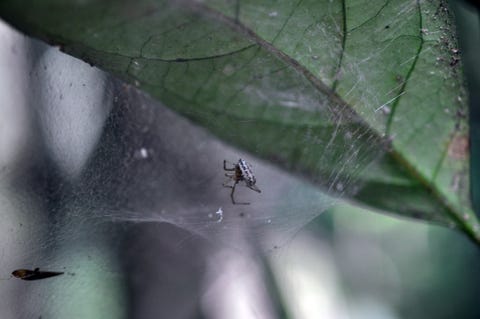A Brazilian Wasp Exhibits Mind Control Over Unsuspecting Spiders
It’s the Mary Poppins of the Arachnid class, crossed with a Dawn of the Dead ending.
By Jill Kiedaisch UNIVERSITY OF BRITISH OF COLUMBIA
UNIVERSITY OF BRITISH OF COLUMBIAIf you were a wasp and needed someone to look after your larvae, you might want to consider hiring Anelosimus eximius. This spider will selflessly abandon its own family and build a specially designed silken cocoon just to keep your pupa safe. It’s the Mary Poppins of the Arachnid class, crossed with a Dawn of the Dead ending.
Parasitoids are known for manipulating the behavior of their hosts to gain an evolutionary advantage (think tapeworms, fleas and ticks, barnacles, Chinese liver flukes). But not all parasites have figured out how to induce their hosts to relinquish their highly social behaviors and build nests that they wouldn’t otherwise build.
A recent study published in Ecological Entomology by the Department of Zoology at the University of British Colombia in Vancouver, BC, articulates how recent findings expand our understanding of this unusual insect relationship. For starters, the spider in question is “a permanent-social species with more developed social behaviors.” They live in large colonies of several thousand individuals and cooperate in predation, feeding, and brood care, whereas most spiders are solitary and exhibit aggressive behavior toward other members of their species. This wasp seems to have selected this particular spider for its reliability as a stable host.
When Philippe Fernandez-Fournier, the lead author of the study, first observed Anelosimus eximius wandering aimlessly away from its colony in Ecuador, he knew something was up. Why would a “permanent-social species” be acting so solitary and detached? What he discovered was that the spider had in essence been “zombified.”
Adult female Zatypota will target an unsuspecting juvenile upon which to lay her egg. The larva then feeds on the spider’s blood to survive—your classic parasite scenario. But these blood-suckers go the extra mile by controlling the spider’s brain so that it abandons its colony and weaves a fully enclosed web of densely spun silk quite distinct from the webs they make for themselves. Once the wasp-Björn is ready, it’s lights out for The Perfect Nanny. The wasp baby kills and consumes its brain-dead caretaker before settling in for nine to 11 days of cozy pupation.
Scientists don’t yet understand how the wasp so handily manipulates its host, but some speculate it might be the result of a hormone injection that tricks the spider into thinking it’s either in a different life stage or that they have no further need for their communal way of life. Or maybe those little wasp-lings are just too cute to resist. Either way, the wasp wins.
Source: University of British Columbia
No comments:
Post a Comment